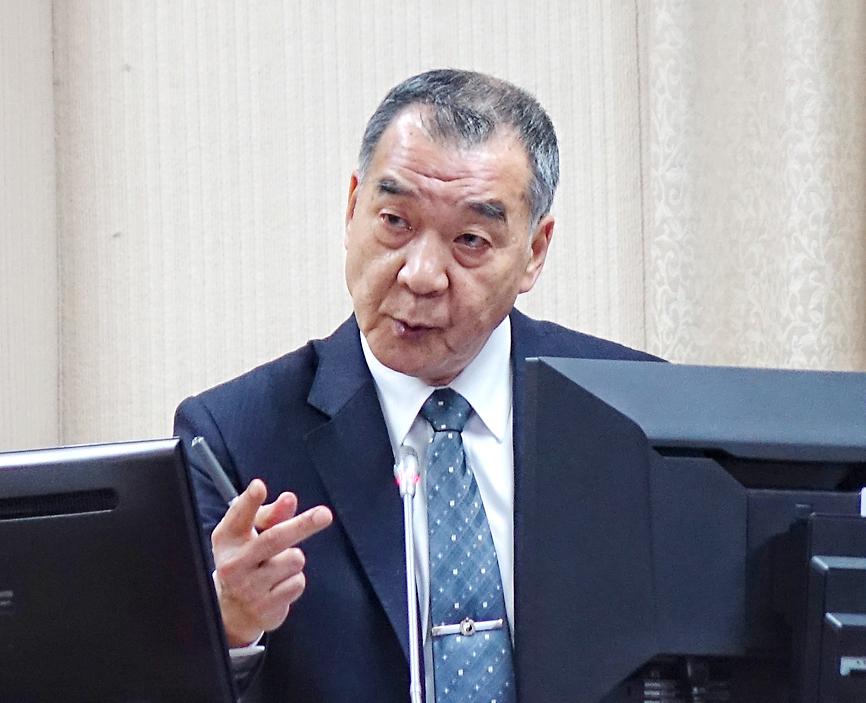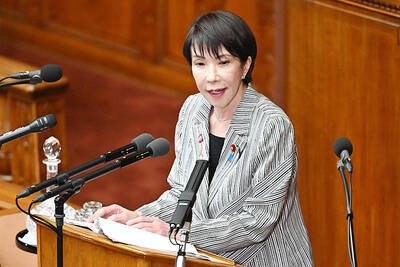China is not likely to change its policy toward Taiwan after the US presidential election, but it is likely to broaden its tactics to pressure Taiwanese businesses and the public into accepting its “one China” political framework, Mainland Affairs Council Minister Chen Ming-tong (陳明通) said in Taipei yesterday.
Chen made the remarks while presenting a report on “The impact of US presidential results on cross-strait relations” at a meeting of the legislature’s Internal Administration Committee.
While several lawmakers expressed concerns about a Taiwan policy shift under the administration of US president-elect Joe Biden, with some describing Biden as being “China-friendly” and others pointing to Biden’s opposition to a bill to strengthen Taiwan’s security in 1999, Chen told lawmakers that a fundamental change in US support for Taiwan was unlikely.

Photo: Liu Hsin-de , Taipei Times
“Although there might be some changes in Biden’s tactics toward China, there will be no change in the China strategy,” he said.
Taiwan and the US share the same values, he added.
While he does not foresee a change in China’s policy toward Taiwan irrespective of the outcome of the US elections, Beijing could escalate its military intimidation to force Taiwan to accept its unification political agenda, he said.
“It is likely that China will broaden its tactics and step up its propaganda campaign to pressure Taiwan’s businesses and different sectors in society to accept its ‘one China’ political framework and heighten Chinese military actions to pressure us into ‘peace talks’ as part of its ‘united front’ strategy,” Chen said.
“China has made an effort to block US involvement in the region, to undermine Taiwan-US cooperation,” he added. “Some adjustments could come in US-China relations after the election outcome, but Beijing has its fixed agenda for dealing with Taiwan, therefore we must still tread carefully in the coming years.”
He cited Beijing’s release last month of its latest Five-Year Plan for National Economic and Social Development, in which it stresses its “one China principle for unification” and deterring Taiwan from declaring independence in its policy section on Taiwan.
“China insists on the option of a military invasion of Taiwan, and [using] provocation and encroachment tactics to undermine cross-strait stability,” Chen said.
Separately, National Security Bureau Director-General Chiu Kuo-cheng (邱國正) was also asked at a meeting of the legislature’s Foreign Affairs and National Defense Committee if US policy on Taiwan would be different after a change in administration.
“No matter which political party takes charge of the US government, overall it will keep its policy to contain China, while being friendly with Taiwan,” Chiu said.
“However, Taiwan must rely on itself... We cannot depend on other countries,” he added.
“When a country has a transfer of power, some policies will continue, and some policies will be adjusted. We have no influence over the course and timetable of their government changeover process,” Chiu said.
The one thing that the bureau can take charge of is to keep on monitoring any moves by China, as “the post-US election period is the most treacherous time for cross-strait relations,” he said.
Additional reporting by Jason Pan and Reuters

The Central Weather Administration (CWA) yesterday said it expected to issue a sea warning for Typhoon Fung-Wong tomorrow, which it said would possibly make landfall near central Taiwan. As of 2am yesterday, Fung-Wong was about 1,760km southeast of Oluanpi (鵝鑾鼻), Taiwan’s southernmost point, moving west-northwest at 26kph. It is forecast to reach Luzon in the northern Philippines by tomorrow, the CWA said. After entering the South China Sea, Typhoon Fung-Wong is likely to turn northward toward Taiwan, CWA forecaster Chang Chun-yao (張峻堯) said, adding that it would likely make landfall near central Taiwan. The CWA expects to issue a land

Taiwan’s exports soared to an all-time high of US$61.8 billion last month, surging 49.7 percent from a year earlier, as the global frenzy for artificial intelligence (AI) applications and new consumer electronics powered shipments of high-tech goods, the Ministry of Finance said yesterday. It was the first time exports had exceeded the US$60 billion mark, fueled by the global boom in AI development that has significantly boosted Taiwanese companies across the international supply chain, Department of Statistics Director-General Beatrice Tsai (蔡美娜) told a media briefing. “There is a consensus among major AI players that the upcycle is still in its early stage,”

The Central Weather Administration (CWA) yesterday said it is expected to issue a sea warning for Typhoon Fung-wong this afternoon and a land warning tomorrow. As of 1pm, the storm was about 1,070km southeast of Oluanpi (鵝鑾鼻), Taiwan’s southernmost point, and was moving west-northwest at 28 to 32kph, according to CWA data. The storm had a radius of 250km, with maximum sustained winds of 173kph and gusts reaching 209kph, the CWA added. The storm is forecast to pass near Luzon in the Philippines before entering the South China Sea and potentially turning northward toward Taiwan, the CWA said. CWA forecaster Chang Chun-yao (張峻堯) said

Japanese Prime Minister Sanae Takaichi yesterday said that China using armed force against Taiwan could constitute a "survival-threatening situation" for Japan, allowing the country to mobilize the Japanese armed forces under its security laws. Takaichi made the remarks during a parliamentary session while responding to a question about whether a "Taiwan contingency" involving a Chinese naval blockade would qualify as a "survival-threatening situation" for Japan, according to a report by Japan’s Asahi Shimbun. "If warships are used and other armed actions are involved, I believe this could constitute a survival-threatening situation," Takaichi was quoted as saying in the report. Under Japan’s security legislation,